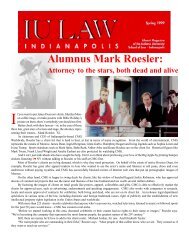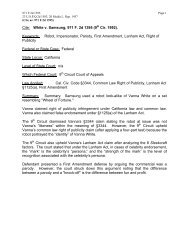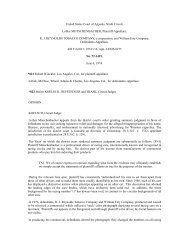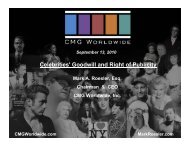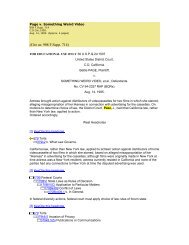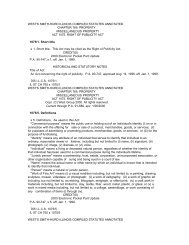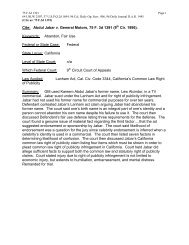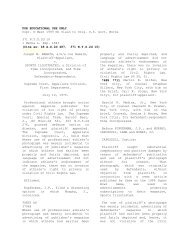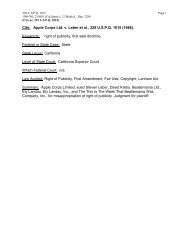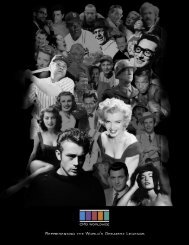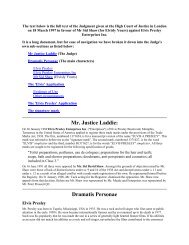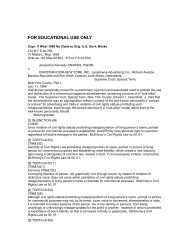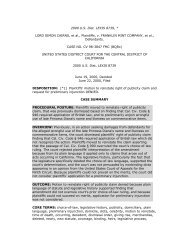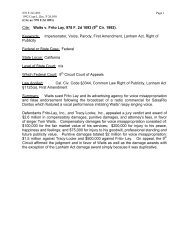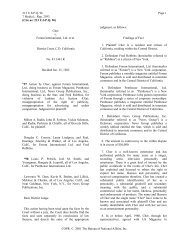Hustler v. Falwell.pdf - Mark Roesler
Hustler v. Falwell.pdf - Mark Roesler
Hustler v. Falwell.pdf - Mark Roesler
Create successful ePaper yourself
Turn your PDF publications into a flip-book with our unique Google optimized e-Paper software.
the Second Circuit's opinion is consistent with Supreme Court [**20]<br />
decisions holding that the "Constitution . . . accords a lesser protection to<br />
commercial speech than to other constitutionally guaranteed expression." Central<br />
Hudson Gas & Elec. Corp. v. Public Service Comm'n of New York, 447 U.S.<br />
557,<br />
563, 65 L. Ed. 2d 341, 100 S. Ct. 2343 (1980) (citing Ohralik v. Ohio State Bar<br />
Ass'n, 436 U.S. at 456, 457). Among the reasons why 'commercial speech<br />
receives<br />
limited First Amendment protection is 'the legitimate public interest in<br />
suppressing "commercial messages that do not accurately inform the public<br />
about<br />
lawful activity." Id. n4<br />
- - - - - - - - - - - - - - - - - -Footnotes- - - - - - - - - - - - - - - - - -<br />
n4 In Central Hudson Gas & Elec. Corp., the Supreme Court also suggested<br />
that<br />
a restriction on non-misleading commercial speech may be justified if the<br />
government's interest in the restriction is substantial and if the restriction<br />
directly advances the government's asserted interest and is no more extensive<br />
than necessary to serve the interest. Central Hudson Gas & Elec., 447 U.S. at<br />
566. In San Francisco Arts & Athletics, Inc. [SFAA] v. United States Olympic<br />
Committee [USOC], 483 U.S. 522, 107 S. Ct. 2971, 97 L. Ed. 2d 427 (1987),<br />
the<br />
Court recently relied on the government's assertion of a strong interest in<br />
promoting, through the USOC's activities, the participation of amateur athletes<br />
from the United States in the Olympic Games to uphold against a First<br />
Amendment<br />
challenge a statute that granted the USOC the exclusive use of the word<br />
"Olympic." There, the Court found that the USOC's use of trademark remedies<br />
to<br />
prohibit the SFAA's use of the word to promote the "Gay Olympic Games" was<br />
not<br />
barred by the First Amendment even though the SFAA claimed to have used the<br />
word<br />
for both commercial and political purposes. SFAA v. USOC, 107 S. Ct. at 2983.<br />
The Court based its holding, in part, on a finding that the SFAA's use of the<br />
word could not be divorced from the commercial value the USOC's efforts had<br />
given to it and was "a clear attempt to exploit the imagery and goodwill created<br />
by the USOC." Id. & n.19.<br />
PAGE 33<br />
695 F. Supp. 112, *119; 1988 U.S. Dist. LEXIS 8694, **20;<br />
8 U.S.P.Q.2D (BNA) 1562; 15 Media L. Rep. 2097<br />
- - - - - - - - - - - - - - - - -End Footnotes- - - - - - - - - - - - - - - - -<br />
[**21]<br />
In addition, the Supreme Court has held that where a company "enjoy[s] the<br />
full panoply of First Amendment protect ions for [its] direct comments on public<br />
issues, [t]here is no reason for providing similar constitutional protection<br />
when such statements are made only in the context of commercial transactions."<br />
Id. 447 U.S. at 563 n.5. Therefore, "advertising which 'links a product to a<br />
current public debate' is not thereby entitled to the constitutional protection<br />
afforded noncommercial speech." Bolger v. Youngs Drug Prod., 463 U.S. [60] at



